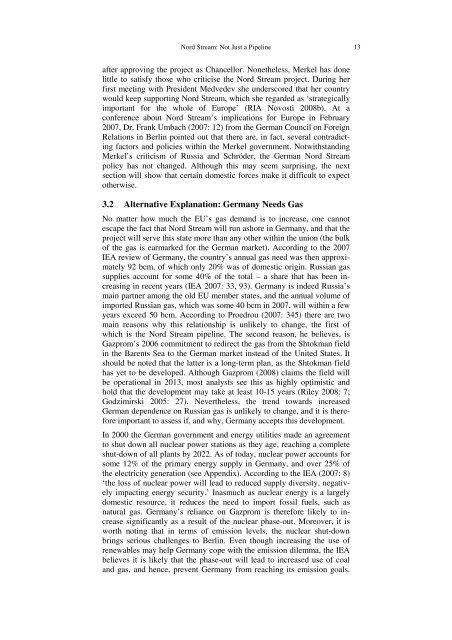Nord Stream: Not Just a Pipeline
Nord Stream: Not Just a Pipeline
Nord Stream: Not Just a Pipeline
Create successful ePaper yourself
Turn your PDF publications into a flip-book with our unique Google optimized e-Paper software.
<strong>Nord</strong> <strong>Stream</strong>: <strong>Not</strong> <strong>Just</strong> a <strong>Pipeline</strong> 13<br />
after approving the project as Chancellor. Nonetheless, Merkel has done<br />
little to satisfy those who criticise the <strong>Nord</strong> <strong>Stream</strong> project. During her<br />
first meeting with President Medvedev she underscored that her country<br />
would keep supporting <strong>Nord</strong> <strong>Stream</strong>, which she regarded as ‘strategically<br />
important for the whole of Europe’ (RIA Novosti 2008b). At a<br />
conference about <strong>Nord</strong> <strong>Stream</strong>’s implications for Europe in February<br />
2007, Dr. Frank Umbach (2007: 12) from the German Council on Foreign<br />
Relations in Berlin pointed out that there are, in fact, several contradicting<br />
factors and policies within the Merkel government. <strong>Not</strong>withstanding<br />
Merkel’s criticism of Russia and Schröder, the German <strong>Nord</strong> <strong>Stream</strong><br />
policy has not changed. Although this may seem surprising, the next<br />
section will show that certain domestic forces make it difficult to expect<br />
otherwise.<br />
3.2 Alternative Explanation: Germany Needs Gas<br />
No matter how much the EU’s gas demand is to increase, one cannot<br />
escape the fact that <strong>Nord</strong> <strong>Stream</strong> will run ashore in Germany, and that the<br />
project will serve this state more than any other within the union (the bulk<br />
of the gas is earmarked for the German market). According to the 2007<br />
IEA review of Germany, the country’s annual gas need was then approximately<br />
92 bcm, of which only 20% was of domestic origin. Russian gas<br />
supplies account for some 40% of the total – a share that has been increasing<br />
in recent years (IEA 2007: 33, 93). Germany is indeed Russia’s<br />
main partner among the old EU member states, and the annual volume of<br />
imported Russian gas, which was some 40 bcm in 2007, will within a few<br />
years exceed 50 bcm. According to Proedrou (2007: 345) there are two<br />
main reasons why this relationship is unlikely to change, the first of<br />
which is the <strong>Nord</strong> <strong>Stream</strong> pipeline. The second reason, he believes, is<br />
Gazprom’s 2006 commitment to redirect the gas from the Shtokman field<br />
in the Barents Sea to the German market instead of the United States. It<br />
should be noted that the latter is a long-term plan, as the Shtokman field<br />
has yet to be developed. Although Gazprom (2008) claims the field will<br />
be operational in 2013, most analysts see this as highly optimistic and<br />
hold that the development may take at least 10-15 years (Riley 2008: 7;<br />
Godzimirski 2005: 27). Nevertheless, the trend towards increased<br />
German dependence on Russian gas is unlikely to change, and it is therefore<br />
important to assess if, and why, Germany accepts this development.<br />
In 2000 the German government and energy utilities made an agreement<br />
to shut down all nuclear power stations as they age, reaching a complete<br />
shut-down of all plants by 2022. As of today, nuclear power accounts for<br />
some 12% of the primary energy supply in Germany, and over 25% of<br />
the electricity generation (see Appendix). According to the IEA (2007: 8)<br />
‘the loss of nuclear power will lead to reduced supply diversity, negatively<br />
impacting energy security.’ Inasmuch as nuclear energy is a largely<br />
domestic resource, it reduces the need to import fossil fuels, such as<br />
natural gas. Germany’s reliance on Gazprom is therefore likely to increase<br />
significantly as a result of the nuclear phase-out. Moreover, it is<br />
worth noting that in terms of emission levels, the nuclear shut-down<br />
brings serious challenges to Berlin. Even though increasing the use of<br />
renewables may help Germany cope with the emission dilemma, the IEA<br />
believes it is likely that the phase-out will lead to increased use of coal<br />
and gas, and hence, prevent Germany from reaching its emission goals.













